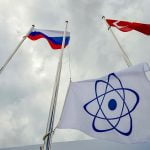Growing tensions between the United States and Turkey, fresh US sanctions against Iran, and falling oil production in Venezuela have increased the possibility of an oil spike.
“I think the chances of a spike have increased significantly primarily for political reasons,” Justin Urquhart Stewart, director at Seven Investment Management in London, told New Europe by phone late on August 10. “Certainly at the moment expecting to see further pressure on that price rise over the next couple of weeks,” he added.
Bilateral relations between Washington and Ankara have hit their lowest point following Turkey’s detention of an American Protestant pastor on charges of espionage. US President Donald J. Trump has imposed sanctions on Turkey in retaliation, a move that Turkish President Recep Tayyip Erdogan pledged to counter, saying his response would prove that those “who think they can destroy Turkey” are wrong.
The Dardanelles – the strategic waterway that divides the European and Asian sides of western Turkey – are a main oil export route to Europe, which leaves NATO-member Turkey plays an important role for security in the region.
Urquhart Stewart said the escalation of tension between Washington and Ankara “does worry me because Turkey is one of the linchpins of NATO. It’s geographically in a key point, politically it’s in a key point and obviously in terms of its relationships with Russia, you find yourself in a position where there’s nation, a member of NATO, which is actually getting arms from Russia.” Turkey is looking to purchase Russia’s S-400 missile system.
Urquhart Stewart said the requirement for Turkey to have good relationships with the US to sustain the alliance is absolutely vital. “If there’s a significant breakdown on that, which looks like there’s going to be, then that would cause a significant level of extra tension in the market,” he said.
The London-based expert said all eyes are on Erdogan and Trump. “Erdogan is a populist. He’s not going to back down anytime soon nor Trump, he’s playing to a domestic market,” Urquhart Stewart said.
He noted that Trump is single-minded over the tariff rises. “I don’t think he appreciates the reaction to his decisions. He doesn’t understand the effect that they will have because he’s looking at a purely domestic market, not an international market. The international market will say that there are greater risks now and the oil price will start going up and will not be down as he was saying to the actions of OPEC but down to his domestic policies,” he said, referring to Trump, who previously has blamed the Organization of Exporting Petroleum Countries for oil price rises.
Regarding Trump’s sanctions against Iran, the EU has launched an attempt to protect European businesses. Moreover, oil production in Saudi Arabia and Russia have increased and could possibly cover a shortfall from Iran. However, Urquhart Stewart stressed that the market remains nervous.
“I think that (Russia and Saudi Arabia) they will pick up that difference. But I think the issue for the market will be the level of the nervousness that’s there and that will put further pressure on the price so although they will act to try and actually put more volume going through, try to see stabilise it, But when you start to see significant nerves, particularly over trade prices, then you will see this putting a premium on the oil prices. And we’re now beginning to see the reaction from the countries as they begin to work out the mathematics of the tariff changes on their economies,” he said.
Meanwhile, declining crude oil production in Venezuela is also a concern. “It’s literally the wild card,” Urquhart Stewart told New Europe. “You have no idea when you turn that card over what you’re going to see on the next stage. It will be again down to the behaviour of an irrational populist,” he said, referring to President Nicolás Maduro of Venezuela. “People trying to look at economic reasons for the changes – don’t look at them. We’re now dealing with emotional changes and that’s a dangerous position to be in,” Urquhart Stewart concluded.







